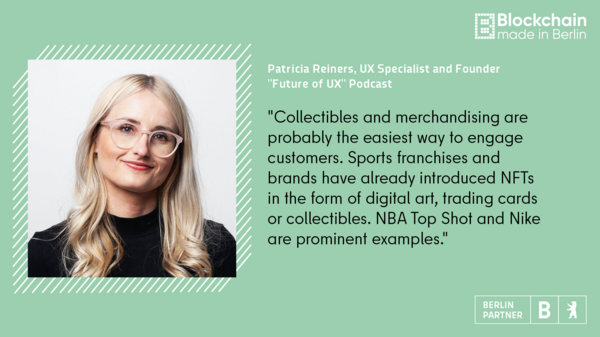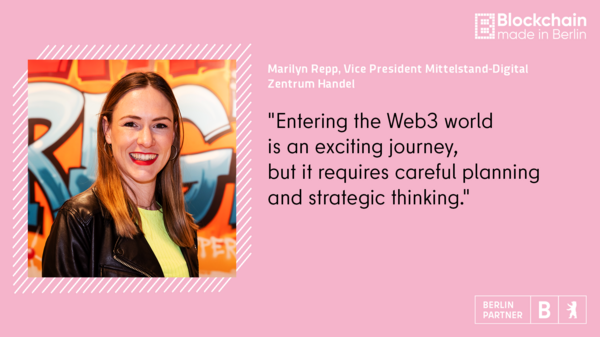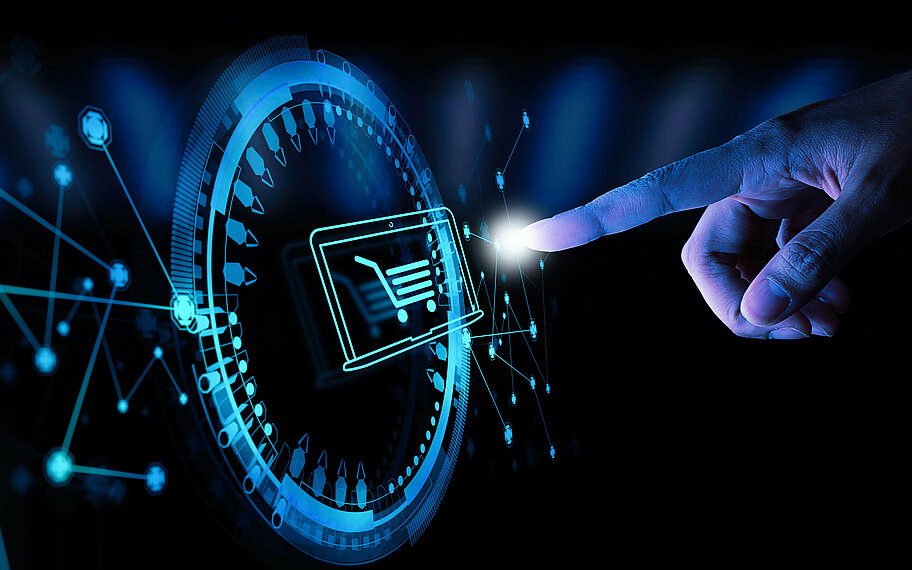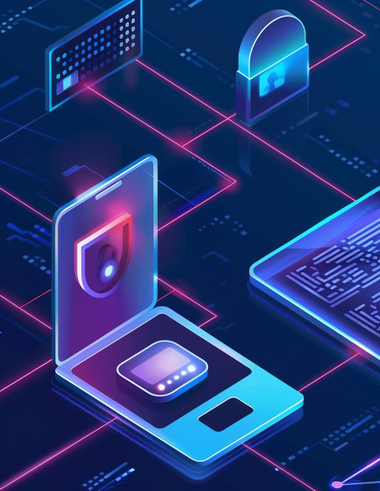How will the future of retail look like? Will downtown stores, pedestrian areas and shop windows - in other words, brick-and-mortar retail - still exist in the near future? Or will online business, which in any case experienced a further upswing during the Corona pandemic, also take over the last stores? In retrospect, it can be said that e-commerce has overtaken stationary retail within less than 20 years. This is also shown by the current Online Monitor 2023 of the HDE Handelsverband Deutschland (German Retail Association). Although online retail experienced a minus of 2.5 percent in 2022 compared to the previous year, compared to the online sales of 2019 - i.e. before the Corona pandemic, the growth amounts to 42.8 percent!
With Metaverse and Web3, the next revolution is just around the corner. Anyone who remembers how many retailers dismissed the internet back in the days now knows that missing the next stage of the Internet can mean huge losses in sales. But what significance can blockchain and digital wallets take on for retailers anyway? And how can new innovations be added to classical retail without replacing it?
Metaverse and virtual shopping experiences
The metaverse is still only a vision and not yet an everyday reality. However, there are initial approaches and communities on platforms such as Discord and Decentraland. Companies are already using the next generation of the internet for marketing or virtual trainings. If retailers want to be part of this, now is the right time to explore. Berlin has a special offer for retailers: the Retail Garage, located at Potsdamer Platz. The showroom, dedicated to digital topics for the retail sector, offered by the Mittelstand-Digital Zentrum Handel. This in turn is a joint project of the Handelsverband Deutschland e.V. (HDE) and the EHI Retail Institute to support the digitization of medium-sized retailers. With frequent events, podcasts and immersive experience stations, the showroom demonstrates how the merchandise management system can be set up in the future. For example, a sales column offers a "view into the barn". Anyone buying eggs or meat in the supermarket can see for themselves via a screen into the chicken yard or pigsty to see how the animals are kept in a species-appropriate manner. Consumers can use a smart shelf with a supplier app based on 3D technology to automate their shopping using QR codes and 3D sensors. Augmented reality apps provide digital product information. And a ServiceNavi for wholesalers helps B2B retailers to optimize their online store.
In the Retail Garage, however, not only will the applications be on display, but personal consultations will also be held. These are intended to offer suggestions and inspiration for interested retailers, who can even rent the space. In this way, technologies and best practices will be shown, and discussions and future applications will be stimulated. And that's what's needed: "Trade is Change" Marylin Repp, Deputy Managing Director of the Mittelstand-Digital Zentrum, quotes an old adage. The market has become tougher, she says. In addition to the increased migration of customers to online retail during the Corona pandemic, there is now a difficult situation with inflation and insecure consumers, as well as constantly new technologies. But Web3 is there in the future to position itself around the consumers.
Patricia Reiners, a freelance innovation and UX designer from Berlin, who regularly speaks about Web3 innovations in her podcast "Future of UX" and at conferences, also sees the focus in the future not on technology, but on people: "For me with a UX background, it is particularly exciting to see how Web3 can change the customer experience, in some cases in a very positive way. Key words: decentralized identities and smart contracts, which offer a new level of personalization."
Loyalty programs with NFTs
Even if Web3 has not yet arrived in our everyday lives, there are already many starting points - including in the retail sector. For consumers, this means that Web3 will have data sovereignty in the future and that the level of participation will increase. Up to now, data has been monetized by big tech companies without involving consumers or data producers. Here, the use of blockchain offers a solution: digital assets can be self-managed and the ownership of digital goods, i.e. data ownership, can be proven in a forgery-proof manner. Many see a new increase of digital value due to Web3.
Marylin Repp wants to help retailers overcome their fear of the big hurdle: "We are moving there step by step. How Web3 can have an impact on community building, customer loyalty, merchandise development and sales is demonstrated, for example, by the Cologne-based party shop company Deiters, which has more than 31 stationary stores and 700 employees. Actually a traditional business, the costume retailer has demonstrated how a successful customer loyalty program can be established around NFTs (non-fungible tokens). By using NFTs, customers became part of a costume community - the Dressed Ape Costume Club - which regularly exchanged information with each other and with the company via the Discord platform, thus providing active feedback on the product range. The Deiters NFT collection consists of 2222 illustrated ape images with different rankings. The real-life benefits linked to them are based on the rarity of the NFTs. Those who hold them get varying levels of discounts for the online store, goodies, event invitations, or surprise dress-up boxes.
Members rceive regular packages of dress-up accessories delivered to their homes, discounts, raffle opportunities and events. The results show: There is a high conversion rate and close brand loyalty within the community. The input from the community even helps to plan the product range. In an increasingly digitized value chain, consumer feedback is having a direct impact on production, says Repp.

Direct Monetization & Secondary Markets
Patricia Reiners also sees several interfaces to Web3 that retailers can already occupy today. "Collectibles and merchandising are probably the easiest way to engage customers. Sports franchises and brands have already introduced NFTs in the form of digital art, trading cards or collectibles. NBA Top Shot and Nike are prominent examples. Nike, for example, has generated over $180 million through its Web3 NFT initiatives." Instead of the traditional points system, this addresses another target group that is young and digitally affine, says Patricia Reiners. Other benefits include transparency in the supply chain, which can be traced thanks to blockchain technology, she said.
Many also use ready digital twins as NFTs coupled with a physical location. "This is particularly useful for luxury goods or products with active secondary markets, as it makes provenance and ownership clearly traceable," Reiners says. "Ownership of the physical object is based on ownership of the NFT."
These use cases are just the tip of the iceberg, and it is likely that even more innovative intersections between retail and Web3 will form in the coming years.

How to get started?
The following applies to all: The affinity and interest in Web3 and the associated possibilities should be present. If you don't want to deal with it, you have to enjoy new challenges. A digital mindset is an absolute prerequisite. Added to this are flatter hierarchies and the opportunities to allow ideas and simply launch test pilots - failures included. Those who establish a test culture and start trying out different possibilities will be well positioned for the coming Web revolution. Marilyn Repp, for example, advocates using new technologies on a monthly basis. After all, if you think digitally, you also think in terms of the customer. Patricia Reiners shares this view:
"Entering the Web3 world is an exciting journey, but it requires careful planning and strategic thinking. It is important that the team has a solid understanding of blockchain technology and Web3 concepts. Thorough market research can also help understand competitor activity and industry trends."
Further sources:
- Decentraland (MANA): Virtual reality platform based on the Ethereum-Blockchain. decentraland.org/
- Discord: Free web browser and app-based video-, text- and voice chatting platform for user communities https://discord.com/
- Fireblocks (2023): Industry Insights. What can Web3 offer retail, luxury goods, and sports brands? Blog article
- HDE Handelsverband Deutschland, IFH Köln: Online Monitor Report 2023. Online-Report
- Pilgrim, Claudia (2022): How web3 is transforming the future of brands and retail. LinkedIn article
- Retail Garage: Showroom for digital innovation and retail technologies. https://www.retailgarage.de




